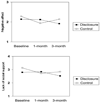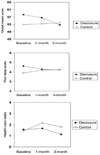The health effects of at-home written emotional disclosure in fibromyalgia: a randomized trial
- PMID: 16972811
- PMCID: PMC2935262
- DOI: 10.1207/s15324796abm3202_11
The health effects of at-home written emotional disclosure in fibromyalgia: a randomized trial
Abstract
Background: The presence and severity of the chronic pain syndrome fibromyalgia (FM) is associated with unresolved stress and emotional regulation difficulties. Written emotional disclosure is intended to reduce stress and may improve health of people with FM.
Purpose: This study tests the effects of at-home, written emotional disclosure about stressful experiences on the health of people with FM and uses multiple follow-ups to track the time course of effects of disclosure.
Methods: Adults with FM (intention-to-treat, n=83; completers, n=72) were randomized to write for 4 days at home about either stressful experiences (disclosure group) or neutral time management (control group). Group differences in immediate mood effects and changes in health from baseline to 1-month and 3-month follow-ups were examined.
Results: Written disclosure led to an immediate increase in negative mood, which did not attenuate across the 4 writing days. Repeated-measures analyses from baseline to each follow-up point were conducted on both intention-to-treat and completer samples, which showed similar outcomes. At 1 month, disclosure led to few health benefits, but control writing led to less negative affect and more perceived support than did disclosure. At 3-month follow-up, these negative affect and social support effects disappeared, and written disclosure led to a greater reduction in global impact, poor sleep, health care utilization, and (marginally) physical disability than did control writing. Interpretation of these apparent benefits needs to be made cautiously, however, because the disclosure group had somewhat poorer health than controls at baseline and the control group showed some minor worsening over time.
Conclusions: Written emotional disclosure can be conducted at home, and there is tentative evidence that disclosure benefits the health of people with FM. The benefits, however, may be delayed for several months after writing and may be of limited clinical significance.
Figures


Similar articles
-
For whom does it work? Moderators of the effects of written emotional disclosure in a randomized trial among women with chronic pelvic pain.Psychosom Med. 2004 Mar-Apr;66(2):174-83. doi: 10.1097/01.psy.0000116979.77753.74. Psychosom Med. 2004. PMID: 15039501 Clinical Trial.
-
Does emotional disclosure about stress improve health in rheumatoid arthritis? Randomized, controlled trials of written and spoken disclosure.Pain. 2011 Apr;152(4):866-877. doi: 10.1016/j.pain.2011.01.003. Pain. 2011. PMID: 21315515 Free PMC article. Clinical Trial.
-
A randomized, controlled trial of emotional disclosure in rheumatoid arthritis: can clinician assistance enhance the effects?Pain. 2008 Jul;137(1):164-172. doi: 10.1016/j.pain.2007.08.031. Epub 2007 Oct 17. Pain. 2008. PMID: 17923329 Free PMC article. Clinical Trial.
-
Behavioural modification interventions for medically unexplained symptoms in primary care: systematic reviews and economic evaluation.Health Technol Assess. 2020 Sep;24(46):1-490. doi: 10.3310/hta24460. Health Technol Assess. 2020. PMID: 32975190 Free PMC article.
-
Emotional disclosure interventions for chronic pain: from the laboratory to the clinic.Transl Behav Med. 2012 Mar;2(1):73-81. doi: 10.1007/s13142-011-0085-4. Transl Behav Med. 2012. PMID: 22905067 Free PMC article. Review.
Cited by
-
Sustained pain reduction through affective self-awareness in fibromyalgia: a randomized controlled trial.J Gen Intern Med. 2010 Oct;25(10):1064-70. doi: 10.1007/s11606-010-1418-6. Epub 2010 Jun 8. J Gen Intern Med. 2010. PMID: 20532650 Free PMC article. Clinical Trial.
-
Arts Therapy and Its Implications in Chronic Pain Management: A Narrative Review.Pain Ther. 2023 Dec;12(6):1309-1337. doi: 10.1007/s40122-023-00542-w. Epub 2023 Sep 21. Pain Ther. 2023. PMID: 37733173 Free PMC article. Review.
-
Written Emotional Disclosure Can Promote Athletes' Mental Health and Performance Readiness During the COVID-19 Pandemic.Front Psychol. 2020 Nov 27;11:599925. doi: 10.3389/fpsyg.2020.599925. eCollection 2020. Front Psychol. 2020. PMID: 33329269 Free PMC article. Review.
-
Pain and emotion: a biopsychosocial review of recent research.J Clin Psychol. 2011 Sep;67(9):942-68. doi: 10.1002/jclp.20816. Epub 2011 Jun 6. J Clin Psychol. 2011. PMID: 21647882 Free PMC article. Review.
-
[Psychotherapy for patients with fibromyalgia syndrome. Systematic review, meta-analysis and guideline].Schmerz. 2012 Jun;26(3):291-6. doi: 10.1007/s00482-012-1179-8. Schmerz. 2012. PMID: 22760462 German.
References
-
- Hayes SC, Wilson KG, Gifford EV, Follette VM, Strosahl K. Experimental avoidance and behavioral disorders: a functional dimensional approach to diagnosis and treatment. Journal of Consulting & Clinical Psychology. 1996;64:1152–1168. - PubMed
-
- Barlow DH, Allen LB, Choate ML. Toward a unified treatment for emotional disorders. Behavior Therapy. 2004;35:205–230. - PubMed
-
- Taylor GJ, Bagby RM, Parker JDA. Disorders of affect regulation: Alexithymia in medical and psychiatric illness. Cambridge: Cambridge University Press; 1997.
-
- Austenfeld JL, Stanton AL. Coping through emotional approach: a new look at emotion, coping, and health-related outcomes. Journal of Personality. 2004;72:1335–1363. - PubMed
-
- Wenzlaff RM, Wegner DM. Thought suppression. Annual Review of Psychology. 2000;51:59–91. - PubMed
Publication types
MeSH terms
Grants and funding
LinkOut - more resources
Full Text Sources
Medical

